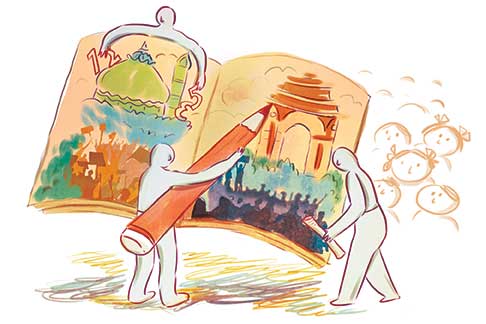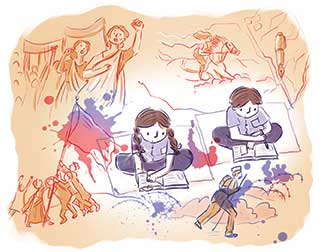Sheel
History – a word that conjures up images of events that took place in ages past, rushing at breakneck speed over millennia, stopping in fascinating clarity at particular moments of time before rushing forward again. Although history is about the lives of other human beings and of society as a whole, in school textbooks it is largely a listing of events, mainly political, that have happened in the distant past. Current history is never a matter of discussion. Yet we also speak of history as “being made” – this happens when we flag some impactful event as one from which some important change has sprung, to be held on to as a memory for ages or generations to come. Clearly, history does not happen as a matter of course, but is influenced by our decisions. This also means that history might be presented in ways that encourage serious reflection about our own actions (or inaction) and the possibility of our active participation in changing the course of history.

One way to engage with history, then, is to consider events “within living memory” – comparing what older people remember about what happened with what is said about such events today. Let’s take, for example, the 1956 reorganization of states in India. The boundaries of states were drawn primarily on the basis of languages. This is an example of an event that is barely within living memory: there are very few people left who have memories of those times. But the Telangana agitation of 1968-69? There certainly are many people alive who remember what it was like to live through those times; some may have even participated in the agitation. Their memories would make a huge difference between learning about the event as a fact of history and history as it was being made because of the actions of specific individuals and groups of people.
But individual memories are not necessarily judgment free – they are selective, fallible, and may contain errors, and they may be too personal to be of any real value. I have a memory of Indira Gandhi’s assassination on October 31st, 1984: it was about 11 am; I had just finished recording my first song off the radio on to a cassette (now historically outdated!), when the Vividh Bharathi announcer broke in to say that Indira Gandhi had been shot dead. It was an unimaginable thought – how could such a thing befall that lady, the pride of our country? What had she ever done to deserve to die like this? Such questions cropped up in the mind of the teenager that I was then. It was only later that I learned that she had been shot at 9:17 am by two of her own security guards, both Sikhs, as she was on her way to a shoot that would document a day in her life. It was only weeks later, after living through the bloody aftermath when many Sikhs were pulled out of their homes and murdered on the roads, that I learned in more detail about the sequence of events from Operation Blue Star onwards. My memories in this case are of no value to history, or to anyone else.

History has to be based on multiple accounts and not just one narrative if we have to make sense of it. You may, like me, be old enough to recall the live images of the demolition of the Babri Masjid clearly – I felt a mixture of fear and rage and despair as I watched the images of people climbing on to the top of the masjid and causing its bricks to tumble down. I watched L K Advani and other leaders vainly trying to control the raging mob – but they could not undo in those moments the surge of the fire they had fanned for months. A history was made then…. The same rage and despair arise in me at the rantings of the Owaisi brothers, or any other leaders (or even news debate hosts these days!) who wish to drive their audiences into frenzies. Could I have done something about it then? Yes, I could have actively taken up my responsibility as a citizen and voiced what I feel and think should be done. But did I? No. Did you? It is the unwillingness to engage with what is going on that causes us to be silent spectators rather than participants in the making of history.
The key point I want to make is: as an individual, can I do something about what is happening now? From climate change to the war in Ukraine, can I take some action? Even if it is simply to voice my opinion, it does mean something. Can I inspire my students to think about what is happening and take action on what they feel is not acceptable in their apartment, their society, their community? Can you? Our future is at stake here: it is we, in the present, who have the power to change the course of history.
The author is a researcher, writer and editor. She can be reached at sheel.sheel@gmail.com.
